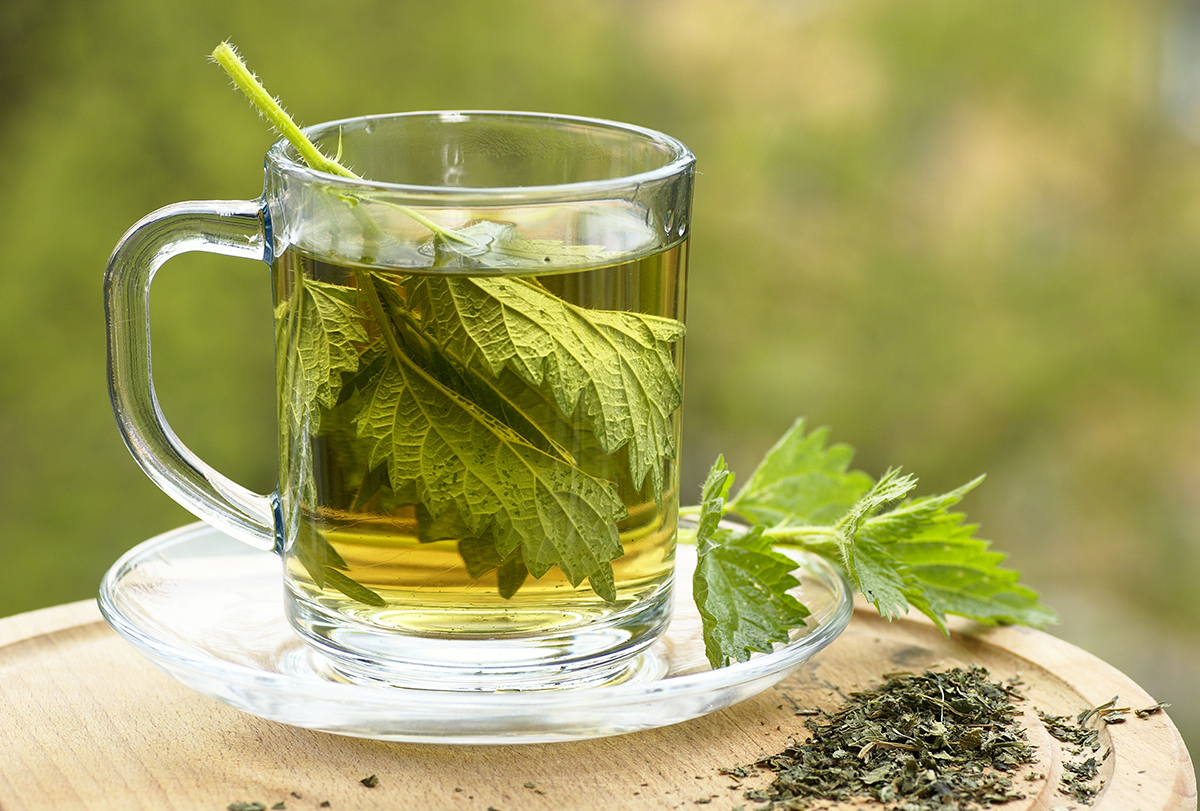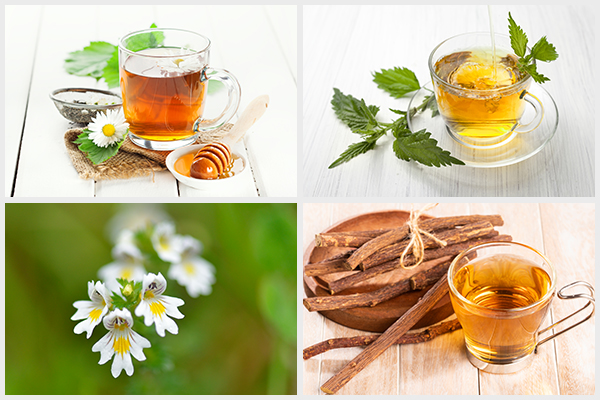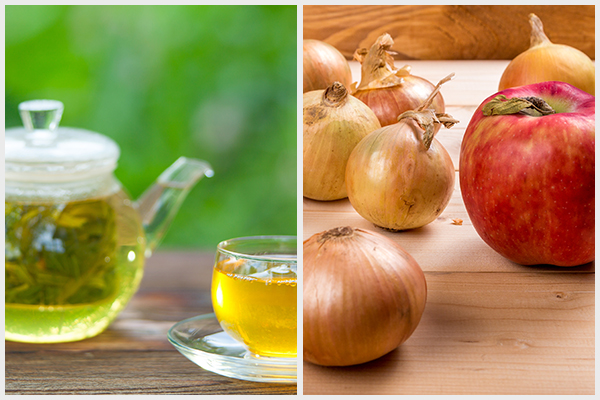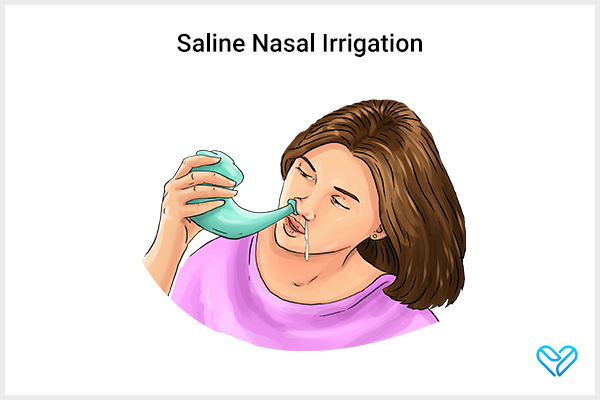In this article:
Spring is in the air, and for many people, that means the return of hay fever, also called allergic rhinitis. The sneezing, itchy eyes, and runny nose can make enjoying the outdoors a challenge.

While medications are commonly used to manage hay fever, several home remedies can also provide relief from the symptoms.
Continue reading to explore the natural remedies for hay fever that you can try at home.
Home Remedies for Hay Fever
The following natural remedies may help provide relief from symptoms of hay fever.
1. Take a spoonful of honey daily
Honey, a sweet and delicious treat, might just be the remedy you need to ease your hay fever symptoms.
According to a study, ingesting a high dose of honey alongside standard medications can significantly improve overall and individual symptoms of allergic rhinitis (AR). In fact, the improvement persisted even a month after the treatment was stopped. (1)
So, next time you’re struggling with hay fever, consider adding a daily dose of honey to your routine. Who knew something so sweet could also be so helpful for your allergies?
2. Brew and drink nettle tea daily
Stinging nettle contains compounds including adenine, nicotinamide, synephrine, and osthole, which have been found to have significant anti-inflammatory effects.
Plus, it acts as an antagonist and negative agonist against the histamine-1 (H1) receptor, helping to block histamine production and release, which are responsible for allergy symptoms.
Moreover, studies have shown that herbal products with antioxidant and anti-inflammatory effects, such as stinging nettle, have been effective in relieving major clinical symptoms and improving the quality of life for people with hay fever.
In a clinical trial, it was found that supportive therapy with a tablet that contains stinging nettle led to a significant decrease in symptoms such as sneezing, nasal congestion, and rhinorrhea. (2)
Note: Drinking nettle tea as a remedy for hay fever may cause an allergic reaction in some individuals, especially those who are sensitive to plants in the Urticaceae family.
3. Drink eyebright tea every day
Eyebright (Euphrasia officinalis) is an herb that has been traditionally used in folk medicine for treating eye disorders. This herb has some interesting properties that could be helpful for hay fever-related eye symptoms. (3)
How to use:
- Boil 1 cup of water.
- Add 1-2 teaspoons of dried eyebright herb to the boiling water.
- Let it simmer for about 5 minutes.
- Remove the pot from heat and let the tea steep for another 10 minutes.
- Strain the liquid to remove the herb.
- Allow the tea to cool down to a comfortable drinking temperature.
- Drink the eyebright tea slowly.

4. Drink licorice tea every morning
Did you know that licorice root, specifically a compound called glycyrrhizic acid (GA), has some interesting properties that may help with hay fever?
GA has been found to have anti-allergy properties, which means it can help reduce the allergic reactions associated with hay fever. This is because GA can help reduce the production of allergen-specific antibodies such as IgE and IgG1, which are responsible for triggering allergic reactions.
GA also inhibits mast cell degranulation, which is the process of mast cells releasing allergy-causing substances. By doing so, it can help alleviate the symptoms associated with hay fever. (4)
How to use:
- Steep 1 teaspoon of dried licorice root in a cup of hot water for 10 minutes.
- Strain and drink the tea.
5. Enjoy green tea in the morning and at night
Did you know that green tea, particularly a specific type called “benifuuki” green tea, has been found to have potential benefits for relieving symptoms of hay fever?
In a study, those who consumed benifuuki green tea for 1.5 months before the pollen season experienced significant improvements in their symptoms. The study also showed that long-term intake of benifuuki green tea reduced the need for nasal symptom medications, such as nasal sprays or antihistamines, during the peak of pollen dispersal.
Moreover, the study demonstrated that individuals in the long-term intake group experienced better relief from symptoms such as throat pain, nose blowing, tears, and hindrance to daily activities. (5)

6. Incorporate quercetin-containing fruits in your diet
Quercetin is a natural compound that can help with hay fever. It belongs to a group of substances called flavonoids, and it’s found in various foods including onions, broccoli, apples, berries, and tea.
Quercetin is packed with antioxidants, which help fight off harmful molecules in the body. Quercetin also has anti-allergy properties, meaning it can help reduce the symptoms of hay fever.
Additionally, quercetin can inhibit the release of histamine, which is a chemical responsible for allergy symptoms. (6)
7. Practice steam inhalation
Take a steamy shower or inhale steam from a bowl of hot water. It helps clear your nasal passages and reduces that annoying blockage. (7)
8. Perform saline nasal irrigation

Research shows that regular saline nasal irrigation (SNI) can have a positive effect on hay fever symptoms in both adults and children.
SNI can lead to a 27.66% improvement in nasal symptoms, providing relief from congestion, sneezing, and itching. Furthermore, SNI can help reduce medicine consumption by 62.1%, potentially allowing you to rely less on medications for symptom management.
SNI can be used alongside other treatments to provide comprehensive relief from hay fever. (8) You can rinse your nose with a saltwater solution. It’s as simple as mixing salt and water, and it helps flush out allergens and thin out that thick mucus. (7)
Preventing Hay Fever
It is a good practice to keep yourself away from any allergen that might be of issue to you. Here are some measures that can help: (9)
- Stay away from things that trigger your allergies, such as house dust mites, mold, pets, and pollen.
- Use allergen-impermeable covers for your bedding to keep those pesky dust mites away.
- Keep the humidity in your home below 50% to prevent mite growth.
- Keep windows closed to reduce exposure to pollen and outdoor mold.
- Install window screen filters and use an air conditioner to further minimize pollen and mold in your home.
- Try to spend less time outdoors during peak pollen seasons.
- Use high-efficiency particulate air (HEPA) filters in your home to reduce allergen levels.
- Keep your bedroom free from animals to minimize exposure to allergens while you sleep.
Most-Asked Questions About Hay Fever
When is hay fever season?
Hay fever season varies depending on where you live, but it typically starts in the spring and lasts throughout the fall.
Can hay fever be cured?
Hay fever can’t be cured, but the symptoms can be managed.
Can hay fever cause asthma?
Hay fever can trigger asthma symptoms in some people.
What is the difference between hay fever and a cold?
The symptoms of hay fever are similar to those of a cold, but hay fever is caused by an allergic reaction, while a cold is caused by a virus.
Is hay fever contagious?
No, hay fever is not contagious.
Can children get hay fever?
Yes, children can get hay fever.
What are the common triggers for hay fever?
The common triggers for hay fever include pollen, dust mites, and pet dander.
Can hay fever cause fatigue?
Yes, hay fever can cause fatigue.
Can hay fever cause headaches?
Yes, hay fever can cause headaches.
How is hay fever treated?
Hay fever is typically treated with antihistamines, nasal sprays, and other medications.
Can hay fever cause eye problems?
Yes, hay fever can cause itchy and watery eyes.
Can hay fever cause skin problems?
Yes, hay fever can cause skin rashes and hives.
Can hay fever be prevented?
Hay fever can’t be prevented, but the symptoms can be managed.
Is hay fever a serious condition?
Hay fever is not usually a serious condition, but it can significantly impact the quality of life if left untreated.
Final Word
Hay fever can be a frustrating and disruptive condition, but a variety of treatments are available to help alleviate the symptoms. It’s important to work with your healthcare provider to find the right treatment plan for you, whether it involves antihistamines, nasal sprays, or other medications.
Additionally, making simple lifestyle changes such as avoiding allergens and keeping windows closed can make a big difference in managing hay fever.
With the right approach, it’s possible to reduce the impact of hay fever on your life and enjoy the beautiful spring and summer months.
 Continue ReadingHay Fever: Causes, Symptoms, Diagnosis, Treatment, and More
Continue ReadingHay Fever: Causes, Symptoms, Diagnosis, Treatment, and More
- Was this article helpful?
- YES, THANKS!NOT REALLY


